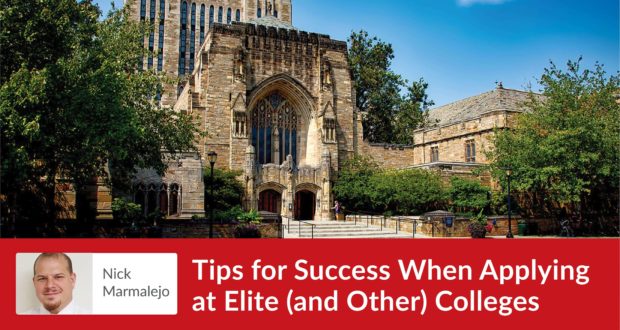Summary
Seton guidance counselor Nick Marmelejo offers advice for families considering Ivy League or other elite colleges. In his realistic manner, he answers frequently asked questions about the criteria that colleges use in their admissions criteria and offers practical tips on the application process.The life of a high school guidance counselor is a bit like that of a travel agent.
Instead of advising someone on the best holiday destinations, fielding questions about colleges and universities is the order of the day.
Frequently, questions encompass the criteria that colleges use in their admissions process and how to apply. Others address the needed qualifications for what are considered by the public to be the “most elite schools.” It is this latter consideration that I address below.
The Allure
The appeal of attending an Ivy League or similarly elite school is multi-faceted. A degree from Harvard, Stanford, or Notre Dame, for example, confers street value by name recognition alone. Perhaps it’s less about the name for you than about the chance to study under a particularly notable professor that beckons, or the opportunity to play a sport or be in a fine arts program.
Whatever the allure might be, like every other school, top schools are not necessarily the apogee of academic perfection. In fact, depending on the professor or subject, the actual education may be of questionable value (gender studies comes to mind). Yet by and large, admittance and academic success at these schools presumes a high level of academic prowess and personal accomplishment.
Hence, the pedigree that comes with an Ivy or a similar diploma confers value beyond the actual education itself. A degree from Princeton or Yale is certainly impressive on the resume, and so makes the prospects of attendance even more attractive to potential students. This is to say nothing of the many networking opportunities that will be had once the students graduate and land in—or are selected for—their chosen field.
Sailors Beware
The fanfare and acclaim surrounding the Ivy League and those like them, however, is all too often a siren’s call to unsuspecting but hopeful scholars and their parents. These centers of education court many able students and encourage them to apply, but only begrudgingly hand out acceptance letters.
According to their own statistics, which are published on their admissions web pages, an applicant typically has a 5-12.5% chance of being admitted depending on the school.
It must also be noted that students seeking admittance into these colleges come from an ever-widening international pool of applicants. Generally, these applicants are as qualified as their peers who are also seeking admission. Practically speaking, this means that even though you may be an exceptional student, so is everyone else.
The majority of these candidates have SAT scores in the 95th percentile or above, SAT subject tests, a 4.0 (unweighted) or higher (weighted) GPA, several AP exams, Honors/AP/IB courses on their transcript, and impressive personal accomplishments outside of the classroom.
The glut of qualified candidates clamoring outside an elite school’s doors would—and likely should—encourage prospective students to consider their other options.
A Recipe for Success?
If the above has not dissuaded you or your student from applying, below is a short list of qualifications that will be needed for consideration, but remember there is no sure fire way to get into an ultra-prestigious school.
- Cumulative 4.0 (unweighted)
- SAT or ACT scores in the 95th Percentile or higher
- SAT subject test exams
- AP exams
- As many Honors/AP/IB classes that you can fit into your schedule in four years
- Absolutely no-fluff courses in your profile or transcript.
- Personal excellence demonstrated outside the classroom, such as achievements in a fine art, sport, or community service
(Note: Achieving the above would be a recipe for successful admittance into any college or university, not just an elite one.)
While Seton does not offer AP or IB classes, Seton does offer several honors courses. As noted in the November 2017 issue of Seton Magazine, students who are seeking to further enhance their transcript are encouraged to sit for the AP course exams in the subjects of their choice and submit their scores along with their transcript to their prospective college.
At the end of the day, each admissions department has its own criteria and ethos for decision making. So I repeat, as noted above, you can be outstanding in every respect, but still be denied admittance.
If One Door Closes…
At Seton we believe academics are important, but consider the salvation of souls to be of the highest and greatest good. Seton partners with authentically Catholic colleges specifically with this end—our end—in mind. However, we realize that not all students can or will attend one of our college partner schools for a variety of reasons.
If you do apply and do not gain entry into an “elite” school, it may be disappointing but it is not the end of the world. Perhaps it’s a blessing in disguise and you just do not know it yet. Hard as it may be to believe, just because you do not make it into a school enumerated in the annual list of Top 10 US Universities by US News & World Report does not mean your budding career or work life has met a premature end.
What it means is that one door opens and another closes. In fact, several academics from top schools have confided to me that, while in the heart of their study program, one that they were excited to begin, they became disillusioned with it.
The converse reality is that an outstanding—if not better, more personalized, and often less costly—education is available elsewhere at lesser known schools. Those places, which harbor some stellar professors and programs, are absolutely worth seeking out.
Furthermore, excellent networking opportunities exist practically everywhere. Regardless of where you went to college, if you are passionate and first-rate in your studies and what you do, doors will be opened for you. Count on it.
In a word, when it comes to picking out the best college for you or your student, do not narrowly define your search only to what the world at large considers “elite.” Do not make admittance into such a school an all-or-nothing proposition. As part of your plan, additionally consider a lesser known or less prestigious college offering a fine yet congenial education.
Whatever your vocational pursuit may be, a brilliant education and future is available to you outside the Ivy League.

 Seton Magazine Catholic Homeschool Articles, Advice & Resources
Seton Magazine Catholic Homeschool Articles, Advice & Resources

